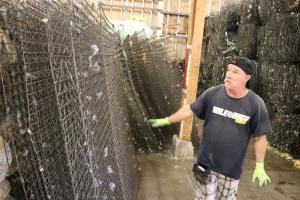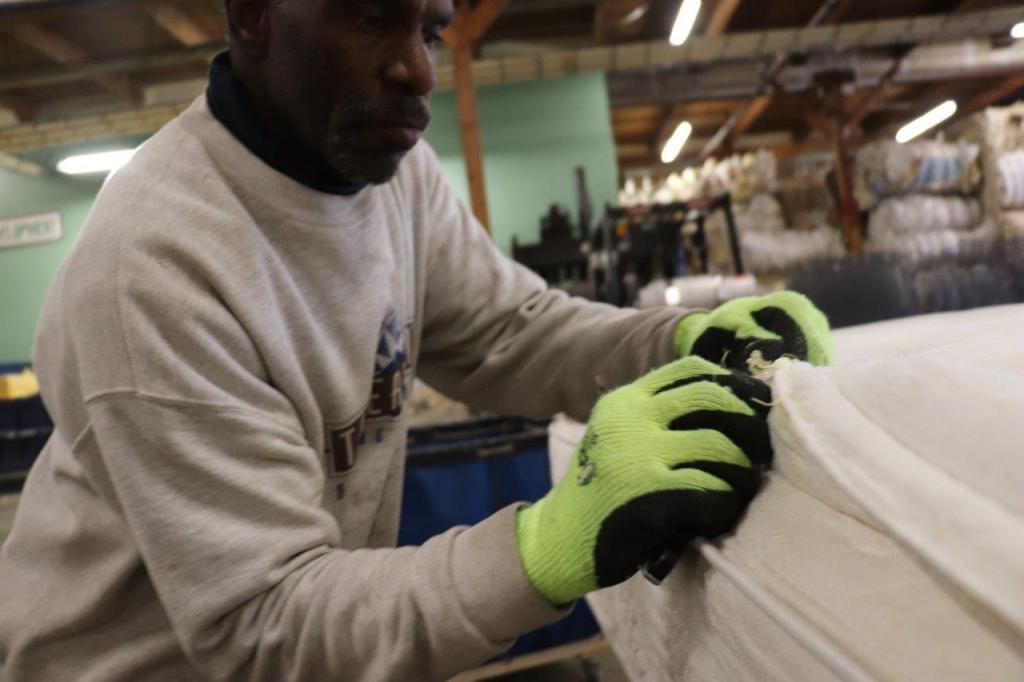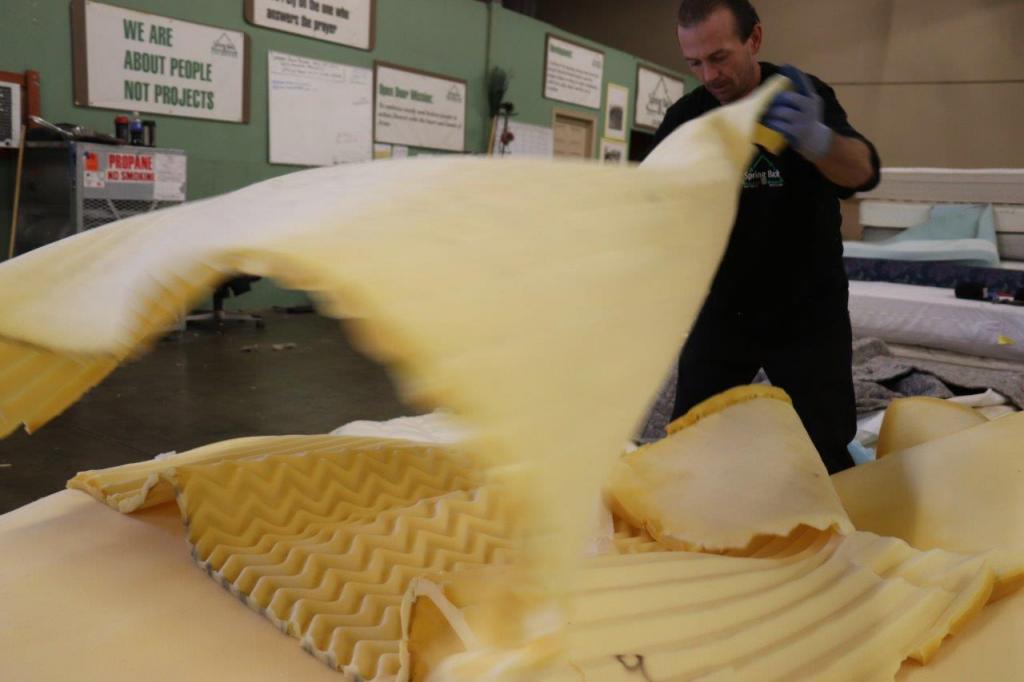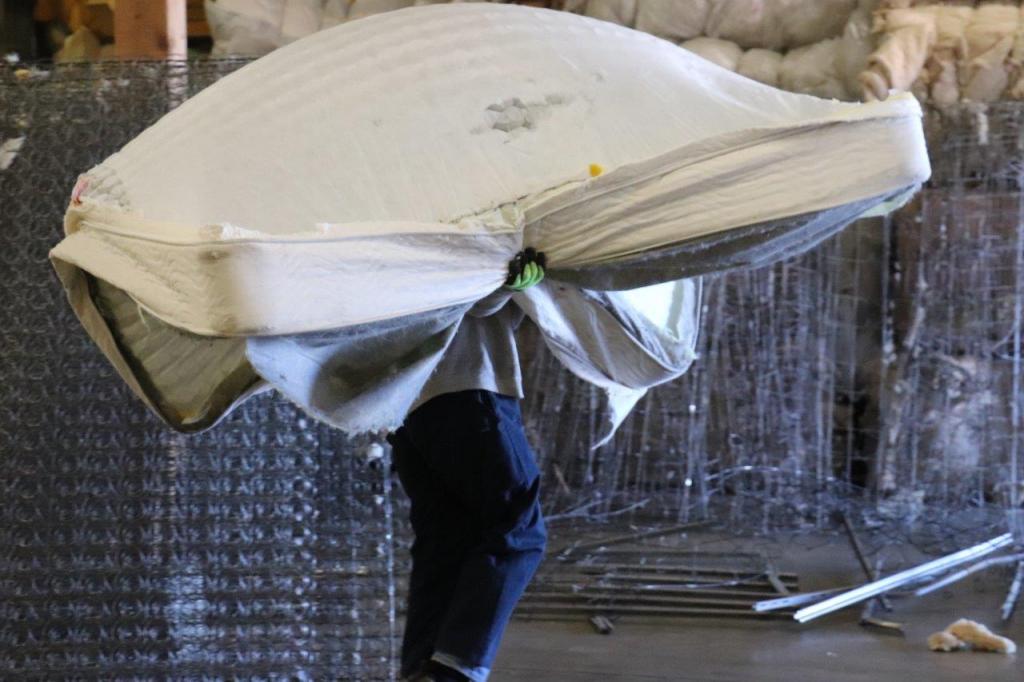If you Look for Good, you can find it. Here’s a story that I wrote a few years ago. It’s about Christopher Conway, the president and founder of Spring Back Colorado, a social enterprise that recycles mattresses and box springs. Since 2012, Spring Back has recycled more than 381,000 mattresses and box springs.
That’s just a dent in the 20 million mattresses and foundations hauled to landfills yearly. End-to-end that yearly number would circle the globe.
“For most people, it’s out of sight, out of mind. They take it to the dump,” said Conway. And mattresses don’t do well in landfills. They are made from material that takes a long time to break down, and because of their bulk and built-in memory, they continually rise to the top of the pile.
“Landfills have got to the point where they don’t see the intrinsic value of taking mattresses, so they are raising prices trying to limit and eliminate that product from their waste stream,” said Conway.
As an alternative, Spring Back disassembles the mattresses and resells the components—steel, foam, fiber, and wood—and the material.
Since 2011, Spring Back has recycled 11 million pounds of steel and cotton, mulching residual wood byproducts.
The recycled commodities market is often depressed, so the operation can’t run solely on funds received from the resale of the products. The shifting sands of the secondary market challenge “the trash train.”
Add to that the cost of running heavy machinery, trucking goods, facility costs, and labor, and the operation is costly to run. They do receive grants, but that doesn’t stop Conway from looking for efficiencies, productivity, and the best bang for the buck in the marketplace.
“Any grants or gifts we get don’t change my life, and they don’t change the employee’s lives, but they allow us to expand and look for new opportunities.”
While their recycling mission resonates with a culture that is increasingly cognizant of the environmental impact of waste, Conway’s primary purpose is helping repurpose lives.
 Giving men a chance to recover
Giving men a chance to recover
“At the core of what we do is to take men in recovery and give them redemptive employment opportunities,” said Conway.
In our society, one of the most significant issues is recidivism — a reentry into the prison system. But if you’ve ever worked with someone trying to reset their life after being arrested, incarcerated and released, it’s not easy.
The ongoing personal and financial cost of reentry into society is exasperating. In many cases, you cannot drive, yet you are expected to work. Those in recovery will receive unannounced drug tests that interrupt a normal work schedule, and without a vehicle, it’s a significant inconvenience to an employer.
The simple path is to go back to prison. That is what first got Conway to consider moving beyond charity and instead building character by providing opportunity.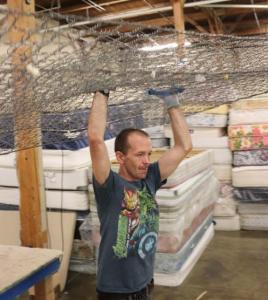
“I saw so many of these hopeless men. They had stopped using drugs and alcohol and went out into the community to find employment but were disqualified because our society is not felon-friendly,” said Conway. “So, I decided to put my marker down and offer felons a chance to gain gainful employment.
Spring Back helps address the practical barriers that most convicts face, such as court fees and drug test costs. But those are temporary measures, simply enabling. So Conway takes it up a notch.
“Most of all, we give these men gainful employment so that they can take care of some of their responsibilities in life-giving them a new beginning.”
Changed Lives
Conway is upfront about his convictions and intentions. “We give them a support system of faith, family, and friends. We’re not trying to sell anything. We want them to enhance their belief systems.”
“Recovery is hard enough on its own, but it’s nearly impossible without a center, something that it all revolves around. For me, it’s a Christ center.”
He says the men who work at Spring Back are “among the finest people I’ve ever been in contact with.” Yet nearly every one of them is an addict – heroin, methamphetamine, or alcohol dependent.
“They just can’t get through life without some additive, said Conway. “But no one wants to be a drug addict. The only between these men and most of are just a couple of bad decisions.”
More than 220 men have worked at Spring Back throughout the years. There have been successes and failures, but Conway keeps the expectations modest.
“Quite simply, we try to fill our men with hope. We want to give them a chance to reformat their families, bodies, and responsibilities.”
He offers the success of a long-term employee named Timothy, who recently got his own apartment and now provides housing for his wife and child. He also got his own driver’s license.
One of the employees’ goals is posted in the workroom: “Get a job, get a better job, get a career.” It’s all about what the men choose to make of their lives, and Spring Back gives them that opportunity.
Living a Life of Yes
For Conway, the entire Spring Back operation has been about saying yes – even when it was uncomfortable.
“I remember saying ‘yes’ to the pastor of my church who asked to move an inch out of our comfort zones,” he said.
That led to volunteering at local homeless shelters.
That opened him to contacting a similar recycling program in Nashville after being featured on National Public Radio.
“I said ‘yes’ to visiting them. And then I said ‘yes’ to develop a mattress recycling facility.”
“I continually said ‘yes’ and seldom said, ‘no.”
Conway encourages others to leave the well-worn paths of comfort. At age 50, he had to learn a whole new business model. He had to learn about court systems and addictions and how to help an entire class of people navigate a system that was unfamiliar to him.
“We’re very comfortable traveling in that well-worn path, seldom deviating. I encourage you to say ‘yes.’ Take a chance! Don’t stay status quo. Take a chance to do something unknown. Be open to being a beginner.”
He believes in staying open to uncertainty.
“I had to say yes to opportunities that I never dreamed of. I had to say yes that I would help others in need. I had to say ‘yes’ to learn about homelessness, drug addiction, and alcoholism.”
None of that was necessarily comfortable, but it was necessary.
“‘No’ is the easy way out. But ’Yes’ is the critical word to what’s happened here. ’Yes’ has been very transformative to me,” he said.
The change has been how he sees himself and others.
“It’s my job to serve and respond to the needs and not sit in judgment about how someone got into their situation,” said Conway. “So, hand the man with a sign three or five dollars and by doing so we start a chain of 15 cars at a stoplight all giving to one human being. This would be a movement of yes.”
“‘Yes’ is the critical word, the easiest three letters that can change our lives and others.”
All photos by David Rupert
Listen to the full podcast of Christopher Conway at the Living a Life of Yes Podcast, Episode 5.


